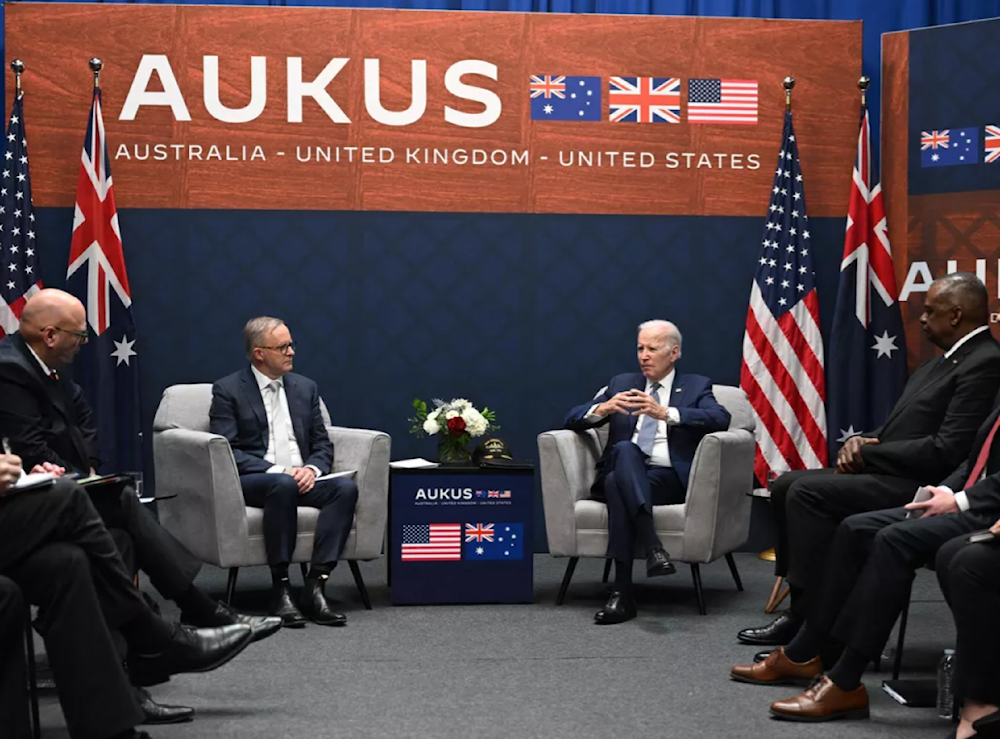US, UK could send nuclear waste to Australia under AUKUS
If the Australian Naval Nuclear Power Safety Bill is enacted, it will establish a nuclear safety watchdog and allow for the construction of naval nuclear propulsion facilities.
-

US President Joe Biden meets with former Australian Prime Minister Anthony Albanese during the AUKUS summit at Naval Base Point Loma in San Diego California on March 13, 2023. (AFP)
According to a legislative probe investigating nuclear safety regulations, the AUKUS contract might make Australia a "poison portal" for foreign radioactive waste.
New regulations establishing a safety framework for Australia's proposed nuclear-powered submarines may also allow the United States and the United Kingdom to bring garbage there, as both nations are struggling to deal with their own waste due to the lack of long-term, high-level waste disposal facilities.
If the Australian Naval Nuclear Power Safety Bill launched last November is enacted, it will establish a nuclear safety watchdog and allow for the construction of naval nuclear propulsion facilities, including those for storing and disposing of radioactive waste from AUKUS submarines. A second law authorizing the regulator to grant licenses was proposed at the same time.
Both have been submitted to a Senate inquiry, which is scheduled to report on April 26.
Dave Sweeney, the Australian Conservation Foundation's Nuclear Free campaigner, called the issue of waste disposal "highly disturbing" and that the AUKUS partners would consider Australia as "a little bit of a radioactive terra nullius."
"Especially when it's viewed in the context of the contested and still unresolved issue of domestic intermediate-level waste management, the clear failure of our Aukus partners to manage their own naval waste, the potential for this bill to be a poison portal to international waste and the failure of defence to effectively address existing waste streams, most noticeably PFAS," he went on to say.
Richard Marles, the military minister, previously accused the Greens of "fear mongering" when they expressed similar worries, claiming that the government would not accept rubbish from other countries.
However, the legislation permits the establishment of facilities for "managing, storing, or disposing of radioactive waste from an Aukus submarine," defining an AUKUS submarine as either an Australian or a UK/US submarine and "includes such a submarine that is not complete (for example, because it is being constructed or disposed of)."
Senator David Shoebridge, the Greens' defense spokeswoman, claimed HMS Dreadnought, one of the UK's first nuclear submarines, has been "rusting away" since it was decommissioned in 1980.
He asked Australian Radiation Protection and Nuclear Safety Agency (Arpansa) chief regulatory officer, James Scott, if one could see them "rusting away in real time" on Google Maps, to which Scott responded, “Yes. There is no disposal pathway yet."
Scott acknowledged there were plans by the UK to "establish a deep geological repository somewhere in the 2050s to 2060s," citing no exact date yet.
"Australia will need to do the same. We are fully aware of this; we are engaging with our own radioactive waste agency, ARWA, on this, and it’s something that needs to be dealt with now, not later.”
AUKUS: UK, Australia sign new defense agreement
The United Kingdom and Australia signed a new defense agreement in Canberra last month, permitting two longtime allies to host troops and share military intelligence.
As revealed by ministers of both countries, this new deal entails a "status of forces agreement" permitting troops from both countries to be deployed and operate in the other.
During a ceremony in the parliament in Canberra, UK Defense Minister Grant Shapps signed the agreement with his Australian counterpart Richard Marles. After the signing, Marles told reporters, "As the world becomes more complex and uncertain, we must modernize our most important partnerships."
"The agreements we reached today will secure this outcome into the future," he added.
The agreement, however, is still not a full mutual defense pact, which would bind one side to interfere if the other was attacked or under threat. Instead, both sides revealed that they had a "commitment to consult" with each other if any was under threat.
Australia set on February 20 a decade-long plan to double its fleet of surface combatant ships from 11 to 26 and enhance defense spending by an additional $7 billion amid the fast-paced Asia-Pacific arms race.
Defense Minister Richard Marles stated, "It is the largest fleet that we will have since the end of the Second World War."

 4 Min Read
4 Min Read








